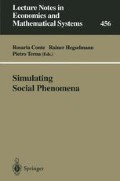Abstract
Using the ‘meme’ conception (Dawkins 1976) of cultural transmission and computer simulations, an exploration is made of the relationship between agents, their beliefs about their environment, communication of those beliefs, and the global behaviours that emerge. This paper builds on previous work using the Minimeme model (Bura 1994). The model is extended to incorporate ‘metamemes’ (beliefs about beliefs). In the simulation scenarios presented, such beliefs have dramatic effects, increasing the optimality of population distribution and the accuracy of existing beliefs.
This paper is based on Hales(1995).
Access this chapter
Tax calculation will be finalised at checkout
Purchases are for personal use only
Preview
Unable to display preview. Download preview PDF.
References
Axelrod, R. (1995). The Convergence and Stability of Cultures: Local Convergence and Global Polarization. Working Paper 95–03–028. Santa Fe, N.M.: Santa Fe Institute.
Bonner, J.T. (1980). The Evolution of Culture in Animals. New Jersey: Princeton University Press.
Boyd, R. & Richerson P. (1985). Culture and the Evolutionary Process. Chicago: University of Chicago Press.
Bulleck, A. (ed.) (1988). Fontana Dictionary of Modern Thought. London: Fontana Press.
Bura, S. (1994). Minimeme: Of Life and Death in the Noosphere. In J. Mayer & S. Wilson (eds.) From Animals to Animats 3: Proceedings of the 3rd International Conference on Simulation of Adaptive Behaviour (SAB94). London: MIT Press.
Dawkins, R. (1976). The Selfish Gene. New York: Oxford University Press. Dawkins, R. (1982). The Extended Phenotype. Oxford: Freeman.
Dawkins, R. (1993). Viruses of the Mind. In B. Dahlbom. (ed.) Dennett and His Critics. Cambridge: Blackwell.
Dennett, D. (1995). Darwin’s Dangerous Idea. New York: Simon & Schuster. Doran, J. ( 1994 ), Modelling Collective Belief and Misbelief In M. Keane, P.
Cunningham, M. Brady, & R. Byrne, (eds.) Proceedings of the Seventh Annual Conference on AI and Cognitive Science (AICS94). Dublin: Dublin University Press.
Epstein, J.M. & Axtell, R. (1996). Growing Artificial Societies: Social Science From the Bottom Up. London: MIT Press.
Hales, D. (1995). Modelling Meta-Memes. Unpublished MSc Dissertation. Department Of Computer Science, University Of Essex, UK.
Hegel, G.W.F. (1845) (Translation 1931). The Phenomenology Of Mind. London: G. Allen & Unwin.
Hegselmann, R. (1996). Cellular Automata in the Social Sciences: Perspectives, Restrictions and Artefacts. In R. Hegselmann, U. Mueller & K.G. Troitzsch (eds.) Modelling and Simulation in the Social Sciences from a Philosophy of Science Point of View [Theory and Decision Library]. Dordrecht: Kluver.
Lynch, A. (1996). Thought Contagion: How Belief Spreads Through Society. New York: Basic Books.
Mathews, R. (1995). It’s a Lottery. New Scientist 1987, 38–42.
Press, H., Flannery, B., Teukolsky, S. & Vetterling, W. (1992). Numerical Recipes in C: The Art Of Scientific Computing. Cambridge: Cambridge University Press.
Reynolds, R. (1994). Learning to Co-operate using Cultural Algorithms. In J. Doran & N. Gilbert (eds.) Simulating Societies: The Computer Simulation of Social Phenomena. London: UCL Press.
Author information
Authors and Affiliations
Editor information
Editors and Affiliations
Rights and permissions
Copyright information
© 1997 Springer-Verlag Berlin Heidelberg
About this paper
Cite this paper
Hales, D. (1997). Modelling Meta-Memes. In: Conte, R., Hegselmann, R., Terna, P. (eds) Simulating Social Phenomena. Lecture Notes in Economics and Mathematical Systems, vol 456. Springer, Berlin, Heidelberg. https://doi.org/10.1007/978-3-662-03366-1_31
Download citation
DOI: https://doi.org/10.1007/978-3-662-03366-1_31
Publisher Name: Springer, Berlin, Heidelberg
Print ISBN: 978-3-540-63329-7
Online ISBN: 978-3-662-03366-1
eBook Packages: Springer Book Archive

